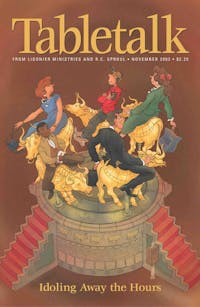
Request your free, three-month trial to Tabletalk magazine. You’ll receive the print issue monthly and gain immediate digital access to decades of archives. This trial is risk-free. No credit card required.
Try Tabletalk NowAlready receive Tabletalk magazine every month?
Verify your email address to gain unlimited access.
After Darkness, Light contains essays in honor of the ministry of R.C. Sproul. This book, however, is not merely a work about R.C. Sproul, but, as the subtitle explains, it seeks to recover the distinctives of Reformed theology. The work itself is a compilation by 10 authors, including, Keith A. Mathison, W. Robert Godfrey, Sinclair Ferguson, Michael S. Horton, and others who explain distinct doctrines of historic Reformed theology.
Godfrey, a church historian, writes about the Reformed distinctive of unconditional election and brings the reader into a discussion of the Synod of Dort. The Synod of Dort was an ecclesiastical gathering of Reformed theologians that met in the Netherlands during the years 1618–1619 to counter and condemn the teachings of Arminianism. Essentially, the teachings of this important synod remind us that election is God’s gracious initiation of salvation for those who place their faith in Jesus Christ. Godfrey explains that election is sometimes difficult to grasp because it so fundamentally challenges human pride. Nevertheless, the classical Reformed and Biblical understanding of election forces us to acknowledge that the entire work of salvation is God’s alone. Godfrey’s essay goes beyond a mere historical analysis of the Synod of Dort and explicates for the reader the Biblical teaching on election.
Horton writes about the doctrine of sola gratia (“grace alone”) and discusses how many evangelicals have neglected this doctrine. The Reformers used the slogan “by grace alone” to indicate that the basis of one’s salvation is solely and completely the work of God’s grace and not anything in the sinner. Human merit or effort will not save anyone. Instead, God’s intervention is the sole cause of salvation. Grace is simply the unmerited favor of God upon the sinner. Scripture is clear about this, and Paul tells us in Ephesians 2:8–9, “For by grace you have been saved through faith and this is not your own doing; it is the gift of God, not a result of works, so that no one may boast.”
Horton points out, however, that in many so-called evangelical and Reformed churches, the doctrinal categories of sin and grace have been obscured, or cashed in, for moral improvement or therapeutic self-help programs. He persuasively argues that there is a “new Pelagianism” of our day that coexists among churches and individuals who would otherwise be thoroughly opposed to it in theory. Rather than allowing historic theology and Biblical categories to drive their theology, many Reformed churches have allowed themselves to be shaped by cultural impulses such as consumerism, pragmatism and psychology, which often lead to worship of the self.
Ferguson writes about the Reformed doctrine of sola fide (“faith alone”). The Reformation slogan “by faith alone” was used by Martin Luther and John Calvin to indicate that justification (God’s accounting of Christ’s righteousness to the sinner) comes by grace through faith. Faith is the instrument that unites the believer to Christ. The Reformers pointed to Romans 3:28 in this regard: “For we hold that one is justified by faith apart from works of the law.” Ferguson also explains that it is God’s graciousness that creates faith in the individual.
Ferguson also asks the interesting question “Why should faith be the appropriating instrument in justification?” This question might seem rather intuitive. After all, faith is that which unites the believer with Christ Himself. We are reminded, however, that faith is the appropriate instrument of justification because in its very nature it is non-contributory in relation to Christ’s righteousness. Ferguson states, “Faith has no constructive energy as it is complete reliance on Christ. It is Christ-directed, not self-directed, and Christ-reliant, not self-reliant. It involves the abandoning, not the congratulating, of self” (p. 83). For modern evangelicals, who seem to be more influenced by Wilsonian “self-determinism,” the doctrine of justification will make little sense. The Bible, on the other hand, is clear that Christ came to rescue those who cannot save themselves.
Mathison writes about the doctrine of sola Scriptura (“Scripture alone”). He explains several positions Christians have taken on the issue of the authority of Scripture and argues for the historic definition of sola Scriptura. Classical Protestants do not take an individualist approach to the Bible. The Reformers argued that although Scripture is the sole source of revelation and the final authority for doctrine and practice, it nevertheless ought to be interpreted in and by the church according to the rule of faith.
The value of After Darkness, Light rests in the way each essay demonstrates how a recovery of the foundational truths of the Reformation can benefit the church today. The slogans of the Reformation are not a collection of scholarly minutiae but signposts that point us to a stronger understanding of Biblical Christianity. The book is from P&R Publishing.
